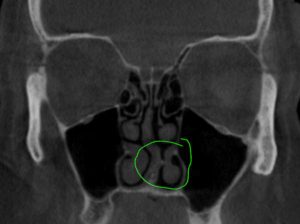Nasal eosinophilic polyps are a type of growth that can develop in the nasal passages. They are made up of inflammatory cells called eosinophils, which are a type of white blood cell. These polyps can cause a variety of symptoms, such as nasal congestion, difficulty breathing through the nose, and a loss of smell. They can also lead to facial pressure or pain.
These polyps are generally benign, meaning they are not cancerous. However, they can cause significant discomfort and affect quality of life.
The exact cause of nasal eosinophilic polyps is not known, but they are believed to be related to an allergic or inflammatory response. They are more common in people with allergies or conditions such as asthma. They may also occur in people who have had a previous infection in their nasal passages, such as a sinus infection.
Treatment for nasal eosinophilic polyps typically includes medications to reduce inflammation and shrink the polyps. These may include corticosteroids, which are anti-inflammatory drugs, or other medications that target specific inflammatory cells. Surgery may also be an option in some cases, particularly if the polyps are large or not responding to other treatments.

